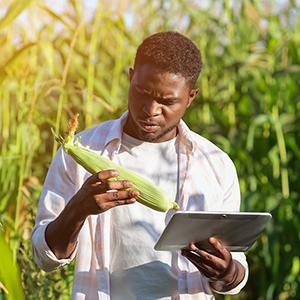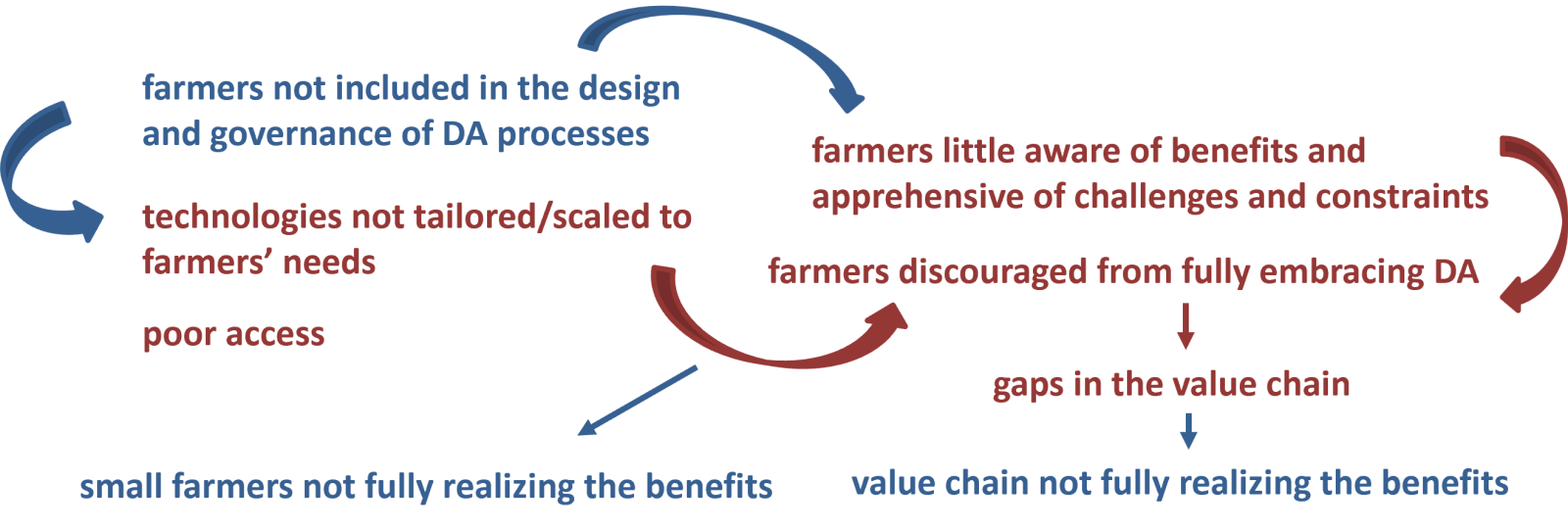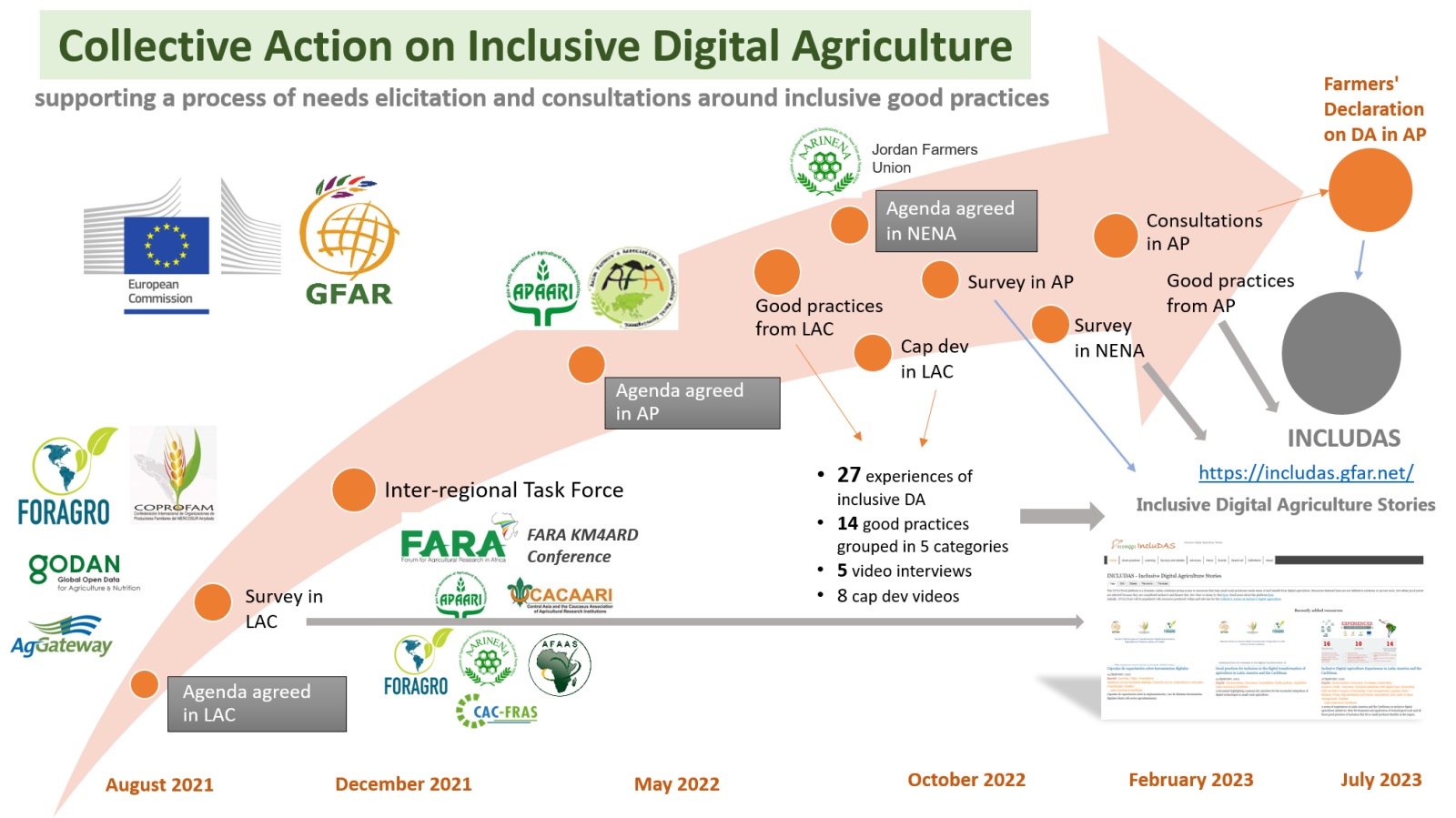The issue
 Digital Agriculture (DA) is expected to increase agricultural production, help adapt to and mitigate the effects of climate change, bring about more efficient use of natural resources, reduce risk and improve resilience in farming, and make agri-food value chains much more efficient. However, digital solutions for these purposes have been demonstrated in advantaged and homogeneous contexts, primarily large-scale agriculture and research projects. Small-scale farmers, who produce between 35% (FAO) and 70% (GRAIN, ETC Group) of the world's food, either use them minimally or don’t use them at all. Which means that not only are small farmers not harnessing the benefits of the ongoing and accelerating digital transformation, but that these solutions are not used diffusely enough to deliver at the scale that is needed.
Digital Agriculture (DA) is expected to increase agricultural production, help adapt to and mitigate the effects of climate change, bring about more efficient use of natural resources, reduce risk and improve resilience in farming, and make agri-food value chains much more efficient. However, digital solutions for these purposes have been demonstrated in advantaged and homogeneous contexts, primarily large-scale agriculture and research projects. Small-scale farmers, who produce between 35% (FAO) and 70% (GRAIN, ETC Group) of the world's food, either use them minimally or don’t use them at all. Which means that not only are small farmers not harnessing the benefits of the ongoing and accelerating digital transformation, but that these solutions are not used diffusely enough to deliver at the scale that is needed.
On the one hand (farmers’ perspective), only well-resourced farmers really thrive on advanced digital technologies, thus widening the rural divide and exacerbating already existing power imbalances; on the other hand (society’s perspective), the promise of more sustainable production and that of transparent “farm to fork” systems rely on the assumption that all actors participate in the agricultural data value chain, and without convinced and informed participation of small-scale farmers these promises will never be realized.

The action
Partners in GFAiR, and primarily the partners involved in this Collective Action (CA), recognize that the key driver towards the full realization of the benefits of the digital transformation of agriculture is the inclusion of small-scale producers in the design and governance of digital solutions, and in the negotiation of related data practices and business models.
The CA aims at empowering small-scale producers to co-develop good practices and negotiate business models that work for them, and at making all other actors in the DA value chain more open to new inclusive practices and business models.
The action takes a bottom-up staged approach, in which each phase builds on the participatory results of the previous one: a) surveys and/or focus groups for a farmer-centric needs/concerns assessment; b) multi-stakeholder consultations for devising best practices for inclusive digital transformation and farmer-fair business models; c) capacity development tools and events; d) pilot experiments of co-creation; e) advocacy for policies.
As of September 2023, activities have taken place at stages a through c.
Expected results
The needs identified and the models and best practices devised during the Action will be the basis for capacity development, pilots and advocacy.
All findings and material produced or used in the Action as well as other relevant publicly available resources will be adapted and organized in an Online Resource Kit for Inclusive Digital Agriculture co-designed with the partners representing small-scale producers.
Outcomes
- Small-scale producers are empowered to develop business models and negotiate practices that make them benefit from DA.
- All actors in the DA value chain are more open to practices and business models that work for small producers.
- Thanks to a more farmer-fair DA value chain (technology, money, data, knowledge), farmers embrace DA technologies with full awareness of benefits and challenges, and capacities to negotiate.
Objective
Enabling farmers as key actors and co-innovators in the design, governance and benefit sharing of Digital Agriculture (technologies, data and infrastructures), as well as the promotion and support of pertinent policies and best practices, so that solutions are inclusive, context-specific and fit to help them increase productivity and income, reduce risk, use natural resources sustainably and mitigate/adapt to climate change.
Partners
The first phase was launched in August 2021 in Latin America and the Caribbean, led by the Forum of the Americas for Agricultural Research and Technology Development (FORAGRO) and in partnership with the Confederation of Family Producers Organizations of the Expanded Mercosur (COPROFAM), the Global Open Data for Agriculture and Nutrition (GODAN) initiative, and the AgGateway consortium of digital agriculture solution providers.
A regional phase in Asia Pacific started in June 2022, coordinated by the Asia-Pacific Association of Agricultural Research Institutions (APAARI) in partnership with the Asian Farmers' Association (AFA). An activity in Near East and North Africa started in September 2022 under the coordination of the Association of Agricultural Research Institutions in the Near East & North Africa (AARINENA) in collaboration with the Jordan Farmers' Union (JFU).
In December 2021, an Inter-regional Task Force was established under the auspices of the Forum for Agricultural Research in Africa (FARA) and with participation from all the GFAiR Regional Fora and regional members of the Global Forum for Rural Advisory Services (GFRAS). Work under this TF may resume under new funding.
Role of GFAiR
GFAiR facilitates the initiation of the partnership and the dialogue between the partners, establishes formal agreements when necessary, liaises with new potential partners, makes sure that the core values and priorities of GFAiR are at the heart of the action, monitors the way the partnership works and the adherence to the partnership principles (primarily, that all partners benefit, that the agenda is set together, that responsibilities are negotiated and shared effectively, that there is mutual learning), and helps with monitoring evaluation and learning and resource mobilization.
[PDF]

What have we done to date?
- January - March 2021:
- Conversations between GFAiR, the World farmers' Organization (WFO) and partners in Latin America and the Caribbean (LAC): Forum of the Americas for Agricultural Research and Technology Development (FORAGRO) and Confederation of Family Producers Organizations of the Expanded Mercosur (COPROFAM), representing family farmers in the LAC region.
- April - July 2021:
- Conversations between GFAiR and potential partners for a first phase in Latin America and the Caribbean (LAC):
- Forum of the Americas for Agricultural Research and Technology Development (FORAGRO), multi-stakeholder regional forum;
- Confederation of Family Producers Organizations of the Expanded Mercosur (COPROFAM), representing family farmers in the LAC region;
- Global Open Data for Agriculture and Nutrition (GODAN) initiative, contributing expertise on data aspects of digital agriculture;
- AgGateway consortium (in particular AgGateway Latin America), representing digital agriculture solution providers.
- Initial collaborations with prospective partners; FORAGRO taking the lead > blog post explaining the rationale behind the CA.
- First presentation of the Action at the AgGateway Education Week in July.
- Conversations between GFAiR and potential partners for a first phase in Latin America and the Caribbean (LAC):
- August - September 2021:
- All partners on board for first phase in LAC: common agenda agreed, workplans aligned.
- Started work on consolidating past findings for the baseline scenario: produced a first infographic.
- Prepared survey on attitudes of smallholder farmers towards digital solutions for agriculture in the LAC region.
- Conversations with the Asia-Pacific Association of Agricultural Research Institutions (APAARI) and the Asian Farmers' Association (AFA) for activities in Asia Pacific.
- Conversations with the Forum for Agricultural Research in Africa (FARA) for activities in Africa; sponsored a participant in the KM4AgD Challenge.
- October - November 2021:
- Sponsored 14 farmers to the OFE2021 conference.
- 13 October: delivered first webinar organized by GODAN on "Data governance in agriculture: including farmers".
- 13 October: presentation of the Action at the OFE2021 conference.
- 14-29 October: conducted survey on attitudes of smallholder farmers towards digital solutions for agriculture in the LAC region.
- Conversations with the Digital Agri Hub project; cross-promotion.
- Conversations for an inter-regional task force on inclusive digital agriculture, proposed by FARA.
- Participation in Digital Agri Hub webinars and e-discussion on Shaping digital agriculture capacities.
- December 2021 - March 2022:
- Launch of the Inter-regional Task Force on Inclusive Digital Agriculture at the KM4AgD final conference in Accra organized by FARA, with participants from FARA/AFAAS, FORAGRO, APAARI, AARINENA and CACAARI/CAC-RAS.
- GODAN briefs: "FARMERS & DATA - Ethical and legal considerations about data sharing aspects of smart farming, from the farmers’ perspective" and "FARMERS & DATA - Access to External Data for Smallholder Farm Use".
- Intensified conversations with APAARI and AFA for activities in Asia Pacific.
- Publication of the FORAGRO/COPROFAM survey results and current scenario in the report "Current Scenario and Needs for the Development of an Inclusive Digital Agriculture Program for Latin America and the Caribbean".
- Survey results summarized and disseminated in a blog post.
- April - July 2022:
- COPROFAM's and FORAGRO's interviews with farmers and solutions' providers.
- Panel session on "Ethical and Legal Issues Around Agricultural Data" at the Annual Meeting of the agricultural data community of the Research Data Alliance (RDA) on 1/4.
- Blog post on Brazilian farmer's experience with digital tools by COPROFAM.
- Common agenda agreed and workplans aligned between APAARI and AFA for phase in Asia Pacific.
- Prototype of the Online Toolkit ready.
- August - September 2022:
- Launch of the CA in Asia Pacific with hybrid event in Bangkok on 4-5/8.
- Interviews and experiences in LAC published, and good practices extracted.
- Online Toolkit published, renamed "INCLUDAS - Inclusive Digital Agriculture Stories".
- Capacity development "capsules" released (see Playlist on YouTube) and administered in the CA in LAC on 20/9.
- Survey in Asia Pacific started.
- Agenda agreed in Near East and North Africa.
- COPROFAM interviews with farmers released (see Playlist on YouTube).
- October - December 2022
- Consultation on good practices conducted in LAC > final version of good practices published.
- Final report of the phase in LAC published.
- Blog post from COPROFAM on the results of the CA in LAC.
- Surveys in Asia Pacific and NENA region completed.
- Panel session titled "Inclusive digital climate-smart technologies: can / will small-scale farmers get on board?" held on 17/11 as side event at COP27 in Sharm el-Sheikh.
- Data analysis of results of APAARI survey.
- January - February 2023
- Mid-term reports from APAARI and AARINENA.
- Multi-stakeholder workshop on identification of good practices in Asia Pacific.
- March - May 2023:
- Final results from AARINENA (report including survey analysis) and APAARI (report including survey analysis).
- AFA continuing consultations with farmers' associations to finalize the Farmers' Declaration on Inclusive Digital Agriculture.
- Blog posts, one on an example of farmer-centric app development and one on an example of farmer-centric capacity development for tailored and needs-based digital transformation.
- June - July 2023:
- Collaboration with YPARD and FARA on the hackathon organized for the 8th Africa Agribusiness and Science Week (AASW): in particular, selection of winner for the category "Small-scale producer friendly and female leadership" and honorable mention for "Small-scale producer friendly".
- In coordination with FORAGRO, co-funded 4 coffee cooperatives in Latin America and the Caribbean for a 4-week training on digital solutions conducted by a start-up (Digital Coffee Future) that follows a participatory, needs-based co-creation approach. Read the report here.
- Session on “Ethical and legal issues around agricultural data” during the 3rd Annual Meeting of the agricultural data (IGAD) Community if Practice of the Research Data Alliance (RDA), addressing topics like fair data governance for small-scale farmers, power imbalances, protecting indigenous knowledge data rights.
- Preparation of e-conversation on digitalization and agroecology in partnership with the Digital Agri Hub, the Agroecology Coalition, and the University of British Columbia. Pre-event blog post: "Digital Agroecology: an Oxymoron?". E-conversation dates: 17 – 28 July.
- August - October 2023:
- E-conversation on digitalization and agroecology extended until 2 August: contributions to the e-conversations published on the e-agriculture platform and on the new GFAiR Hub; final summary re-posted and publicized.
- Final version of the Asian Farmers' Call for Action: "Inclusive Digital Transformation of Agriculture: A call for action from small-scale farmers in Asia". resulting from consultations among 13 family farmers' associations in 9 countries.
